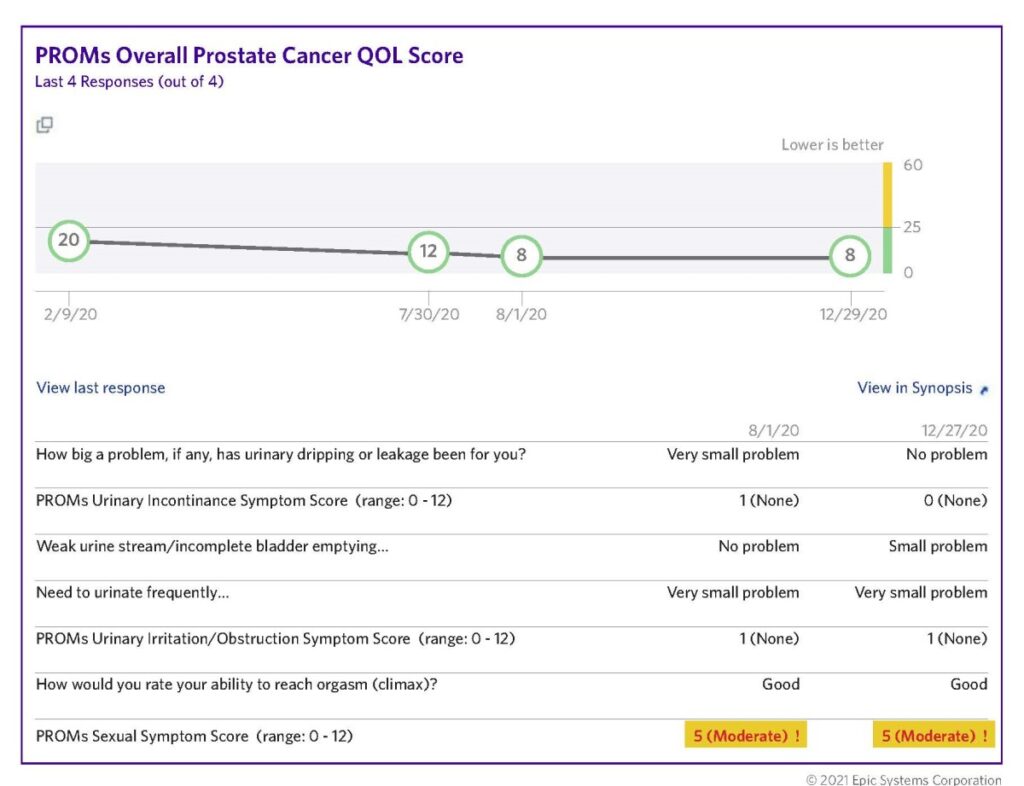 The Division of Urology at Brigham and Women’s Hospital provides expert, individualized care for a range of urological conditions. Because many urological treatments have similar clinical outcomes, division surgeons are gathering data called patient-reported outcome measures (PROMs). They plan to use PROMs to better identify the nuances of treatment outcomes and determine how these outcomes affect quality of life for individual patients.
The Division of Urology at Brigham and Women’s Hospital provides expert, individualized care for a range of urological conditions. Because many urological treatments have similar clinical outcomes, division surgeons are gathering data called patient-reported outcome measures (PROMs). They plan to use PROMs to better identify the nuances of treatment outcomes and determine how these outcomes affect quality of life for individual patients.
The U.S. Food and Drug Administration (FDA) has defined PROMs as “any report of the status of a patient’s health condition that comes directly from the patient, without any interpretation of the patient’s response by a clinician or anyone else.” It has been shown that the patient’s direct reporting of the outcomes of surgery though questionnaires is more accurate than verbal reports. Therefore, PROMS are better at helping physicians guide patient interactions and allowing patients to evaluate surgeons and treatment options.
The initiative to collect PROMs from urology patients is part of a larger program at the Brigham called PROVE (Patient-Reported Outcomes, Value & Experience), which focuses on using innovative techniques to study outcomes that matter most to patients and their caregivers. The PROVE Center uses cutting-edge methodologies to build condition-specific PROMs and implement these and other measures into research, quality improvement and assessment of health care value.
“One of our goals is to amplify the patient’s voice in surgical decision-making and care,” said Andrea Pusic, MD, chief of plastic and reconstructive surgery and director of the PROVE Center. “One of the ways we do that is by transforming raw patient-reported data into meaningful output and actionable insight.”
Collecting and Leveraging PROMs Data
According to Dr. Pusic, the Brigham’s Division of Urology is doing great work in gathering PROMs data and starting to analyze it; each of the 600 prostatectomy patients seen annually at the Brigham is asked to participate. Surgeons plan to begin using the data to guide patient care within the next few months, said Quoc-Dien Trinh, MD, director of the division’s ambulatory clinical operations.
“We are collecting PROMs data from patients with a number of conditions, including bladder cancer, benign prostatic hyperplasia and prostate cancer,” Dr. Trinh said. “We track how patients are doing before, during and after treatment to see real-time metrics as well as how they progress over time.”

Urology-related PROMs data include the severity of post-treatment side effects, such as sexual (erectile) dysfunction, urinary incontinence and irritation, and gastrointestinal complaints. It also includes measures of overall physical and mental well-being.
“As a surgeon, I find PROMs data useful in establishing a patient’s baseline function and monitoring their progress,” Dr. Trinh said. “Patients find PROMs data useful because it gives them an individualized prediction of exactly what they can expect from treatment, based on reported outcomes from patients with similar experiences. It’s a more refined prediction and helps patients decide which course of treatment and surgeon are right for them.”
PROMs Prompt Patient Conversations
Dr. Trinh’s patients fill out a short questionnaire on the Brigham’s online patient portal or on an iPad in the clinic to provide PROMs data. For example, urinary incontinence questions concern whether the patient has experienced any leakage, the number of diapers or pads used each day and how incontinence has impacted their daily activities. Dr. Trinh reviews the answers before each patient visit and uses the information to guide the conversation with the patient.
“Patients appreciate that I am well-prepared and not staring at patient file notes at the start of every appointment,” he said. “Not only does it save time, but it also helps me build rapport with my patients.”
Dr. Trinh said the PROMs data has been especially useful for connecting with patients during virtual visits, where the lack of in-person interaction can make it difficult to assess details about the patient’s quality of life.
“Measuring PROMs doesn’t replace a face-to-face conversation,” Dr. Pusic said. “However, it does improve the effectiveness and efficiency of patient visits and gives patients the opportunity to report issues that may otherwise not come to light.”
PROMs Infrastructure Supports Innovation
PROMs are becoming an increasingly important part of the Brigham’s infrastructure for continuous improvement and innovation.
“They help us identify surgeons who have superior outcomes and can serve as a source of training and coaching for other surgeons,” Dr. Trinh said. “They also provide important data on the long-term implications of new treatment modalities, allowing us to evaluate new techniques and technologies from the patient’s perspective to ensure they optimize patients’ quality of life.”